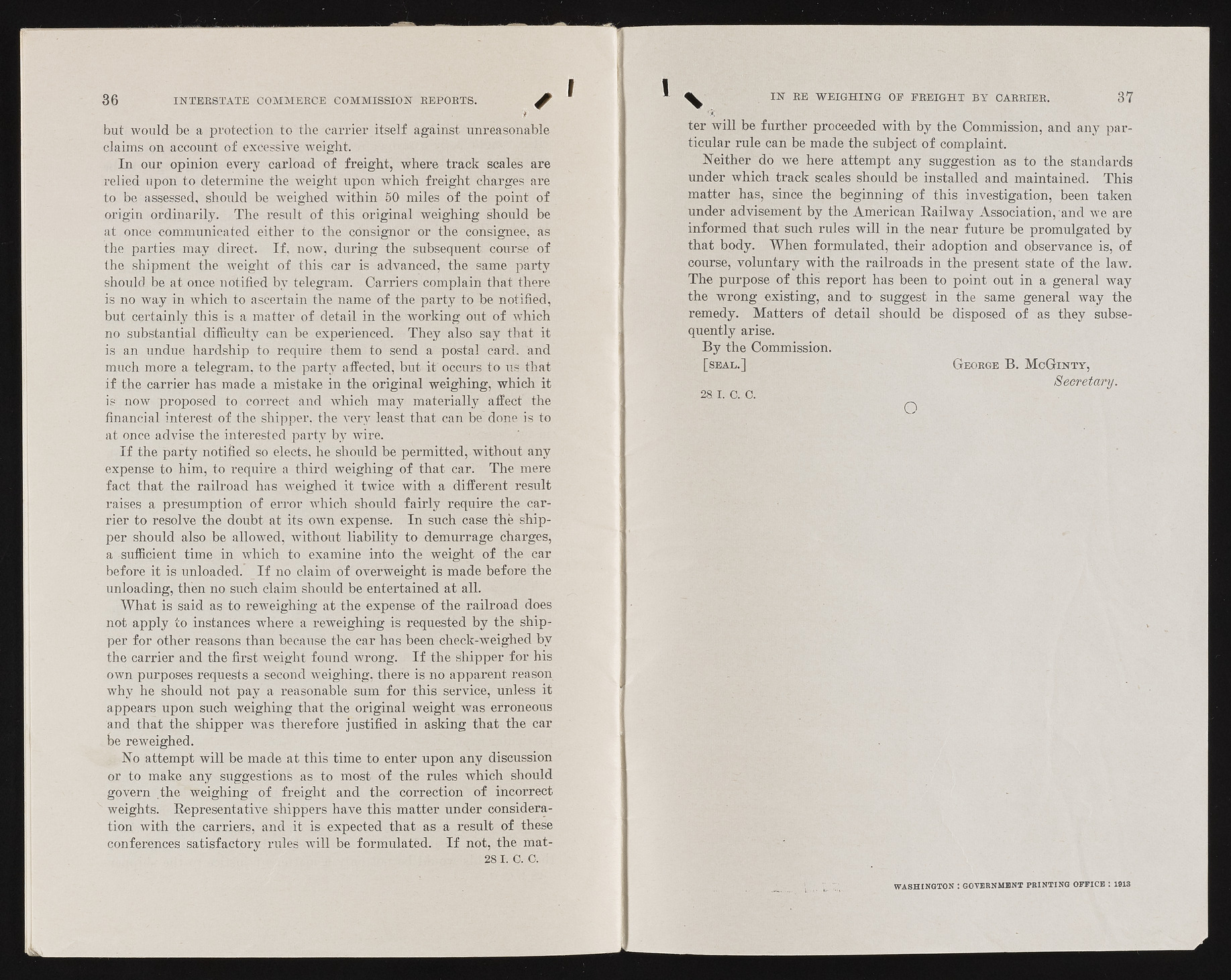Copyright & Fair-use Agreement
UNLV Special Collections provides copies of materials to facilitate private study, scholarship, or research. Material not in the public domain may be used according to fair use of copyrighted materials as defined by copyright law. Please cite us.
Please note that UNLV may not own the copyright to these materials and cannot provide permission to publish or distribute materials when UNLV is not the copyright holder. The user is solely responsible for determining the copyright status of materials and obtaining permission to use material from the copyright holder and for determining whether any permissions relating to any other rights are necessary for the intended use, and for obtaining all required permissions beyond that allowed by fair use.
Read more about our reproduction and use policy.
I agree.Information
Digital ID
Permalink
Details
Member of
More Info
Rights
Digital Provenance
Publisher
Transcription
36 INTERSTATE COMMERCE COMMISSION REPORTS. f ?: ;V: ., }%' but would be a protection to the carrier itself against unreasonable claims on account o f excessive weight. In our opinion every carload o f freigh t, where track scales are relied upon to determine the weight upon which freigh t charges are to be assessed, should be weighed w ithin 50 miles o f the point o f origin ordinarily. Th e result o f this original w eighing should be at once communicated either to the consignor or the consignee, as the parties may direct. I f , now, during the subsequent course o f the shipment the weight o f this car is advanced, the same party should be at once notified by telegram. Carriers complain that there is no w ay in which to ascertain the name o f the party to be notified, but certainly this is a matter o f detail in the w orking out o f which no substantial difficulty can be experienced. Th ey also say that it is an undue hardship to require them to send a postal card, and much more a telegram, to the party affected, but it occurs to us that i f the carrier has made a mistake in the original w eighing, which it is now proposed to correct and which may m aterially affect the financial interest o f the shipper, the very least that can be done is to at once advise the interested party by wire. I f the party notified so elects, he should be permitted, without any expense to him, to require a third w eighing o f that car. Th e mere fact that the railroad has weighed it twice w ith a different result raises a presumption o f error which should fa irly require the carrier to resolve the doubt at its own expense. In such case the shipper should also be allowed, without lia bility to demurrage charges, a sufficient time in which to examine into the w eight o f the car before it is unloaded. I f no claim o f overweight is made before the unloading, then no such claim should be entertained at all. W h at is said as to reweighing at the expense o f the railroad does not apply to instances where a rew eighing is requested by the shipper fo r other reasons than because the car has been check-weighed by the carrier and the first weight found wrong. I f the shipper fo r his own purposes requests a second weighing, there is no apparent reason why he should not pay a reasonable sum fo r this service, unless it appears upon such w eighing that the original w eight was erroneous and that the shipper was therefore justified in asking that the car be reweighed. N o attempt w ill be made at this time to enter upon any discussion or to make any suggestions as to most o f the rules which should govern the w eighing o f freigh t and the correction o f incorrect weights. Representative shippers have this matter under consideration with the carriers, and it is expected that as a result o f these conferences satisfactory rules w ill be formulated. I f not, the mat- 28 I. 0. C. ^ IN RE W EIG H ING OE FREIGHT BY CARRIER. 37 ? m ter w ill be further proceeded w ith by the Commission, and any particular rule can be made the subject o f complaint. Neither do we here attempt any suggestion as to the standards under which track scales should be installed and maintained. Th is matter has, since the beginning o f this investigation, been taken under advisement by the Am erican R ailw ay Association, and we are inform ed that such rules w ill in the near future be promulgated by that body. W hen formulated, their adoption and observance is, o f course, voluntary w ith the railroads in the present state o f the law. The purpose o f this report has been to point out in a general way the w rong existing, and to- suggest in the same general w ay the remedy. M atters o f detail should be disposed o f as they subsequently arise. B y the Commission. [ s e a l .] - G eorge B. M cG i n t y , Secretary. 28 I. c. C. mm W A S H IN G T O N : G O V E R NM E N T P R IN T IN G O F F IC E : 1913

